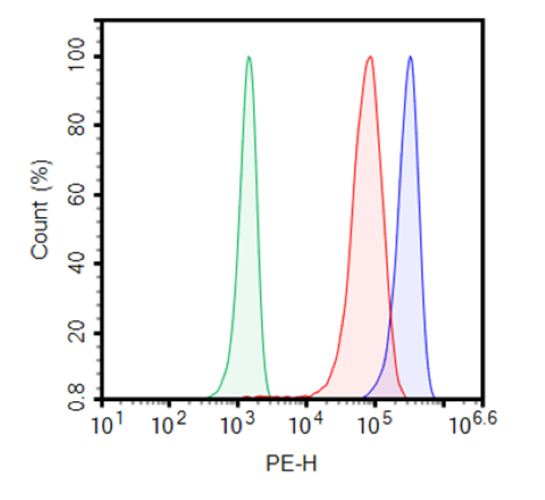CD40L K562 Cell Line (Medium and High Expression)
CD40L K562 Cell Line is a K562 cell line that expresses full-length human CD40 Ligand (NM_000074.3). This stable clonal cell line was selected for its medium or high level of CD40L expression compared to the parental K562 cell line. Surface expression of CD40L was confirmed by flow cytometry.
Purchase of this cell line is for research purposes only; commercial use requires a separate license. View the full terms and conditions.
Media Required for Cell Culture
| Name | Ordering Information |
| Thaw Medium 2 | BPS Bioscience #60184 |
| Growth Medium 2M | BPS Bioscience #78181 |
The cell line has been screened to confirm the absence of Mycoplasma species.
CD40L (CD40 ligand), also known as TNFSF5 (tumor necrosis factor receptor superfamily 5) and CD154, is a type II membrane glycoprotein that exists in cells in a membrane bound (mCD40L) and a soluble (sCD40L) form. It is found at high levels in activated CD4+ T cells, and at lower levels in Th1, Th2, Th17 and Tregs. Expression can also be induced in NK cells, CD8+ T cells, basophils, and others. CD40 and CD40L are stimulatory immune checkpoints, and their signaling is mediated by different TRAF (TNF receptor associated factor), in a cell and stimuli-dependent mode. For example, it mediates the activation of the NF-κB (nuclear factor kappa-B) pathway. The role of CD40 and CD40L as immune checkpoints makes them highly attractive targets in cancer therapy, and several clinical trials using anti-CD40 or anti-CD40L agonist antibodies or trying to increase their expression are underway, targeting both hematological and solid tumors. The inhibition of CD40:CD40L interaction is also clinically relevant, and clinical trials have been focusing on treatment options for lupus, rheumatoid arthritis and ALS (amyotrophic lateral sclerosis). Further studies and development of refined therapies will continue to benefit the cancer therapy field and patients suffering from autoimmune disorders.
Annis A., et al., 2004 J. Amer. Chem. Soc. 126(4): 15495-15503.
Yan, T., et al., 2001 J. Cellular Biochem. 83(2): 320-325.
Tang T., et al., 2021 Pharmacol Ther 219:107709.


